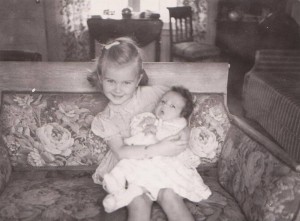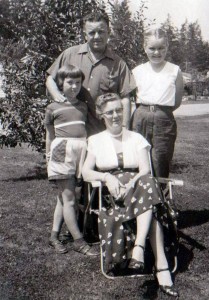Jolted awake by the phone at 4am in my friend’s house in Berkeley, I knew. My father was dead. In Canada: thousands of miles away. My good parent: dead at 69. I was 37. Back in Australia, I grieved alone for months.
My loving, distressed husband finally announced, “I’m worried, Wendy. This grief has been going on for too long. You need help.”
My good parent: dead at 69.
This week the phone rings in Australia. My sister – at a more convenient hour. Our bad parent has died – in her hundredth year. In Vancouver. Thousands of miles away.
“I’m sorry for your loss,” a dozen emails respond. I wince at the banal language. My friends! Surely, they can do better than that! Hallmark Cards ads used to trumpet: “When you care enough to send the very best.”
Not their best language, that’s for sure. But it’s Christmas – and I forgive them. And they’re tongue-tied, poor souls. What to say? What to say about the death of a bad parent?
Decades of demonisation
Only a wise spiritual teacher finds accurate words. Reflecting on our work together 25 years ago, he emails: “The event of your Mother’s death after what seems like decades of demonisation must be profound.” Decades of demonisation. And he knew only a fragment, a glimpse. More decades to come.
No wonder my friends can’t find appropriate language. Word fail me.
Borderline Personality Disorder
It’s widely accepted that mental illness tears families apart. It ruins lives. Borderline Personality Disorder is a shocker, especially for children of the Borderline Mother (see https://www.psychologytoday.com/blog/stop-walking-eggshells/201109/the-world-the-borderline-mother-and-her-children).
We spend our lifetimes gaining our freedom after living such a warped childhood. Smother-love alternates with sharp rejection. Narcissism. Histrionics. Depression. Humiliation.
Unspeakable abuse.
The whole shooting match! It can make you crazy.
Two bewildered, terrified young daughters adrift on a stormy sea. Alone with the madwoman.

Our motto: “No good deed will go unpunished.”
How am I coping?
Many wise friends counsel me at this time. Most live far away so I don’t find them standing at my front door holding casseroles covered with chequered napkins, as I’d imagined. Intently, compassionately, they inspect my face on Skype. How am I coping?
I ask: What should I do? It’s such a long trip. The middle of winter. Will I regret it if I don’t go? Will I regret it if I do?
They say: It’s a passage, a milestone, a transition. You need to mark it. It’s important. The beginning of your new life.
An hour on the phone with Andrew, blessed gift of a friend, settles it. He was my planning student thirty years ago. Wise beyond his years.
I’ll fly to Vancouver. A generous friend of forty years’ standing will pay.
Friends I’ve known for over sixty years will wrap their arms around me. Perhaps a tear will come then?
My sister and I will find ways to do what needs to be done. A delicate balancing act.
An appalling childhood has some bittersweet advantages. It makes you strong – if it doesn’t kill you. Seven decades of pain and grief melt into this: two wise, capable and resilient women have emerged from the crucible of living – and negotiating – with a severe mental illness.
Gone to God
“Gone to God,” my husband pronounces over the furry grey micro bat trapped in our shed, lying on its back, black eyes fixed on the ceiling. He wraps it in a tea towel, carries it gently outside and buries it in the front garden.
Gone to God.
Awake at 3 am, I sip my tea, tucked up like a sick child. The ceiling fan struggles in the humid night air. A kookaburra is waking in the tree by my window.
You’re with God now, Mary
“You’re with God now, Mary,” I whisper.
“You can rest. It’s all right, Mother, truly. You are fine now.”
“Trust me. You don’t have to worry any more, Mary.”
Breathe, Wendy.
We are fine now.
We don’t have to worry any more.

It is hard to understand the divine plan. Why someone would choose to be, or under another world view, why somebody would be randomly lumbered with mental disability. Why would another ‘choose’ to be the child of someone suffering mental illness. Wendy, your writings show cathartically, that you are now at peace and you have recognised that along with all that pain, you and your sister emerged as two very strong and powerful women. Experience is the sand that presses back into our feet as we journey through life. Breathe, Wendy. You have always been fine….. very fine.